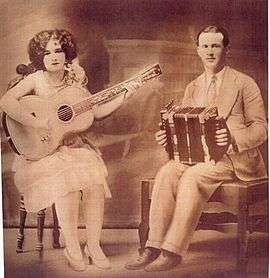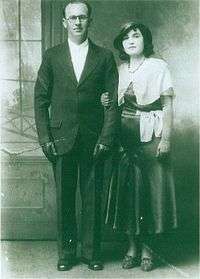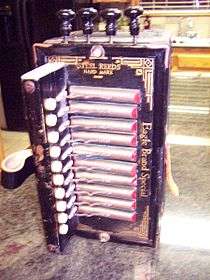Joe Falcon
| Joe Falcon | |
|---|---|
|
Joe Falcon in 1934 | |
| Background information | |
| Born |
September 28, 1900 Roberts Cove, Louisiana, United States |
| Died | November 19, 1965 (aged 65) |
| Genres | Cajun |
| Occupation(s) | Musician, Accordionist |
| Instruments | Vocals, Accordion |
| Labels | Columbia Records, Arhoolie Records |
Joseph Falcon (September 28, 1900 – November 19, 1965) was a Cajun accordion player in southwest Louisiana, best known for the first recording of a Cajun song; "Allons à Lafayette" in 1928 . He and his wife Cléoma Breaux[1] left for New Orleans to record the first Cajun record and went on to perform across southern Louisiana and Texas.[2]
Early life
Joe was the fifth child of Pierre Illaire Falcon and Marie Arvilia Boudreaux.[3] Pierre (whose paternal grandparents, José Félix Falcon and María Antonia Damasa Falcon, were descendants from Spanish settlers Cristóbal Falcón and Gaspar Falcón, who hailed from Telde (Gran Canaria) and migrated to Louisiana in 1778), spoke Canarian Spanish and French. Marie was of Acadian descent.[4] He was born near a small German community north of Rayne, Louisiana known as Roberts Cove, located by Bayou Plaquemine Brule. He began playing accordion at the age of seven.[3]
Music career
His career as a professional musician began some years later at a fais-do-do hall called the "Blue Goose" (Oneziphore Guidry's dance hall) in Rayne, Louisiana when the regular band didn’t show up and the dance hall owner insisted that Joe take their place.[5][6]
As a young man, Joe was friends with accordionist Amédée Breaux of the legendary Breaux family and sometimes accompanied him on triangle. Amédée’s sister, Cléoma, a gifted guitarist and singer, became Joe’s frequent accompanist and they married not long after the onset of their recording career.
In April 1928, a police juror from Rayne, Louisiana and native New Orleanian,[7] George Burrow, persuaded Columbia records to record Joe and his wife Cléoma and their friend, Leon Meche, by agreeing to purchase 500 records.[6][8] However, in the hotel recording studio, Meche backed down; scared he would mess up the recording. Joe stepped up and sang instead. In a 1962 interview with Mike Seeger, Columbia executive, Frank Buckley Walker, recalls recording the duo:
- So I went up to Lafayette for a weekend. I happened to know something of the story of the Cajuns and was astounded at the interest that there was in their little Saturday night dances. A single singer would have a little concertina-type instrument and a one-string fiddle and a triangle, those were the instruments, but they would always have a singer and of course they sang in Cajun. And to me it had a funny sound. So I brought down a little group. I think his name was Joe Falcon. I brought him down to New Orleans, and we recorded just to have something different. We put it on the market, and it had tremendous sales. [9]
Recorded on April 27, 1928 in New Orleans, "Lafayette" caused a sensation when it was released by Columbia Records in the summer of 1928.[10] Thousands of copies were sold and Falcon became the first Cajun-recording star, playing to packed dance halls in Louisiana and neighboring Texas. Joe and Cleoma recorded more material at sessions in New York City in August 1928 and Atlanta in April 1929. After a hiatus caused by the onset of the Great Depression, the couple resumed their recording career in 1934, recording again in New York, then at New Orleans in 1936 and San Antonio in 1937. Cléoma died suddenly on April 9, 1941, but Joe continued to perform as leader of Joe Falcon and His Silver Bell String Band, which included his second wife, Theresa Meaux, on drums.[11]
Despite this success, Joe’s career flagged in the late 1930s with the increasing popularity of fiddle-based country-and-western influenced bands. His music came to be considered old-fashioned and he stopped recording after his last session in 1937. Though Joe continued to play local dances into the 1960s, he declined to make further recordings,[6] maintaining he had been cheated by record companies.[12]
- Allons a Lafayette Listen (MP3)
- Madame Sosthene Listen (MP3)
- La Valse Crowley Listen (MP3)
Discography
- "Allons à Lafayette"/"Waltz That Carried Me To My Grave" (Columbia 15275-D, Okeh 90018) April 27, 1928 in New Orleans, LA[13]
- "Fe Fe Poncheaux" / "Le Vieux Soulard Et Sa Femme (The Old Drunkard And His Wife)" (Columbia 15301-D) August 27, 1928 in New York, NY.
- "A Cowboy Rider" / "Marie Buller" (Columbia 40502-F, Okeh 90002) August 27, 1928 in New York, NY.
- "Vieux Airs (Old Tunes)" / "La Marche De La Noce (Wedding March)" (Columbia 15325-D) August 27, 1928 in New York, NY.
- "Prenez Courage (Take Courage)" / "Quand Je Suis Partis Pour Le Texas(Columbia 40503-F, Okeh 90003) April 18, 2929 in Atlanta, GA.
- "C'Est Si Triste Sans Lui (It Is So Blue Without Him)" / "Elle M'A Oublie (She Has Forgotten Me)" (Columbia 40508-F, Okeh 90008) April 18, 2929 in Atlanta, GA.
- "Poche Town" / "Ossun" (Columbia 40506-F, Okeh 90006) April 18, 1929 in Atlanta, GA.
- "Madame Sosten" / "Mes Yeux Bleus" (Decca Records 17000)
- "Joseph Falcon: Cajun Music Pioneer" (Arhoolie ARHO 970459, 1963)
- "Jai Passe Devant Ta Porte" / "Corrina Corrina" (Crazy Cajun Records 514)
- "La Jolie Fille N’en Veut Plus de Moi" / "Ne Buvez Plus Jamais" (Decca Records)
- "Pas La Belle De Personne Que Moi (Nobody's Darling But Mine)" / "Jeuste Parcque (Just Because)" (Decca Records 17015, March 12, 1936)
- "Je Suis Laissee Seule" / "Blues de Leebou" (Decca Records 17057, December 15, 1937)
Compilations
- "Joseph Falcon And His Silver Bell String Band - Louisana Cajun Music" (F 5005 Arhoolie, 1968)
- "Pioneers of Cajun Accordion 1926-1936" (LPOT128 Old Timey / Arhoolie, 1989)
- "Cajun Vol. 1 - Abbeville Breakdown: 1929-1939" (CK 46220 Columbia Records, 1990)
- "Cajun Dance Party: Fais Do-Do" (CK 46784 Columbia Legacy, 1994)
- "Joe Falcon - Cajun Music Pioneer" (CD 459 Arhoolie, 1997)
- "Cajun: Early Recordings" (JSP7726 JSP, 2004)
- "Cajun - Rare & Authentic" (JSPCD77115 JSP, 2008)
Photographs




See also
References
- ↑ Fontenot, Kevin; Brasseaux, Ryan Andre (2009). "Cleoma Breaux Falcon and the Commercialization of Cajun Music". In Allured, Janet; Gentry, Judith. Louisiana Women: Their Lives and Times. Georgia: University of Georgia Press. pp. 237–252. ISBN 978-0-8203-2947-5.
- ↑ "Falcon, Joseph and Cléoma". Archived from the original on 1999-02-24. Retrieved 2009-10-18.
- 1 2 "Cajun French Music Biography". Archived from the original on 2008-01-21. Retrieved 2009-10-18.
- ↑ Telde Actualidad. Un descendiente canario en Luisiana: el primero en grabar un álbum de música de Cajún (in Spanish: A Canarian descend was the first person to record a Cajun music record). Written by Wade Falcón.
- ↑ Savoy 1984, an interview with Joe Falcon.
- 1 2 3 Broven, John (1983). South to Louisiana: The Music of the Cajun Bayous. Pelican Publishing. pp. 15–19. ISBN 978-0882896083.
- ↑ Brasseaux, Ryan Andre (2009). Cajun Breakdown : The Emergence of an American-Made Music. Oxford University Press. p. 49. ISBN 978-0195343069.
- ↑ Millard, Andre (2005). America on Record: A History of Recorded Sound (2nd ed.). Cambridge University Press. pp. 246–247. ISBN 978-0521633307.
- ↑ Seeger, Mike (1962). "Frank Buckley Walker. Columbia Records Old-Time Music Talent Scout" (PDF). Retrieved 2014-05-19.
- ↑ "The Dawn of Cajun Music 1928-1929". Retrieved 2009-10-18.
- ↑ "Joe and Cléoma Falcon were first to record Cajun music". Retrieved 2009-10-18.
- ↑ "PBS - American Roots Music". Retrieved 2009-10-18.
- ↑ "Joe Falcon". Archived from the original on 2008-06-25. Retrieved 2009-10-18.
- ↑ "The Isleños of Louisiana". Archived from the original on 2007-09-28. Retrieved 2009-10-18.
Savoy, Ann (1986) [1984]. Cajun Music a Reflection of a People. Eunice, Louisiana: Bluebird Press. ISBN 978-0-930169-00-8.